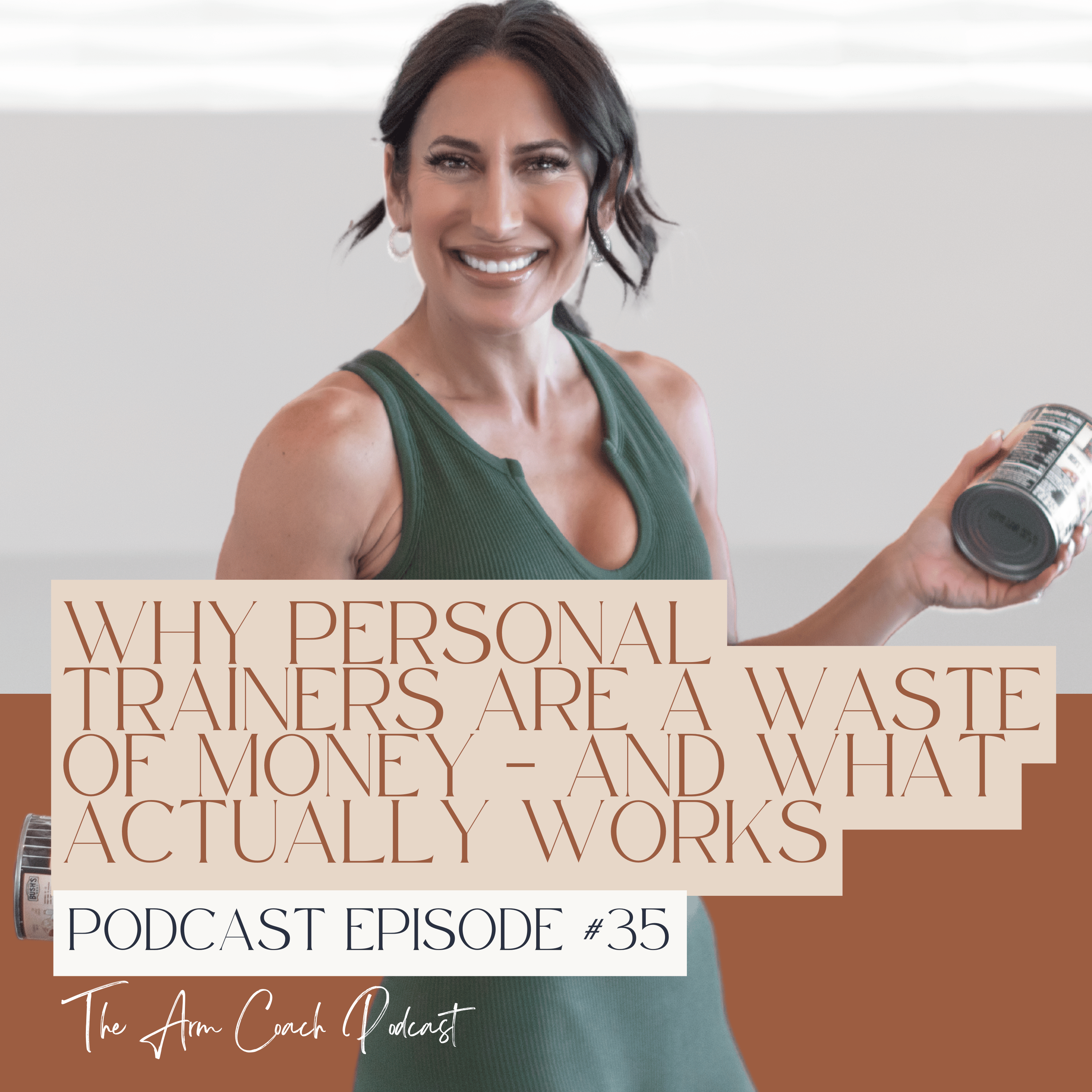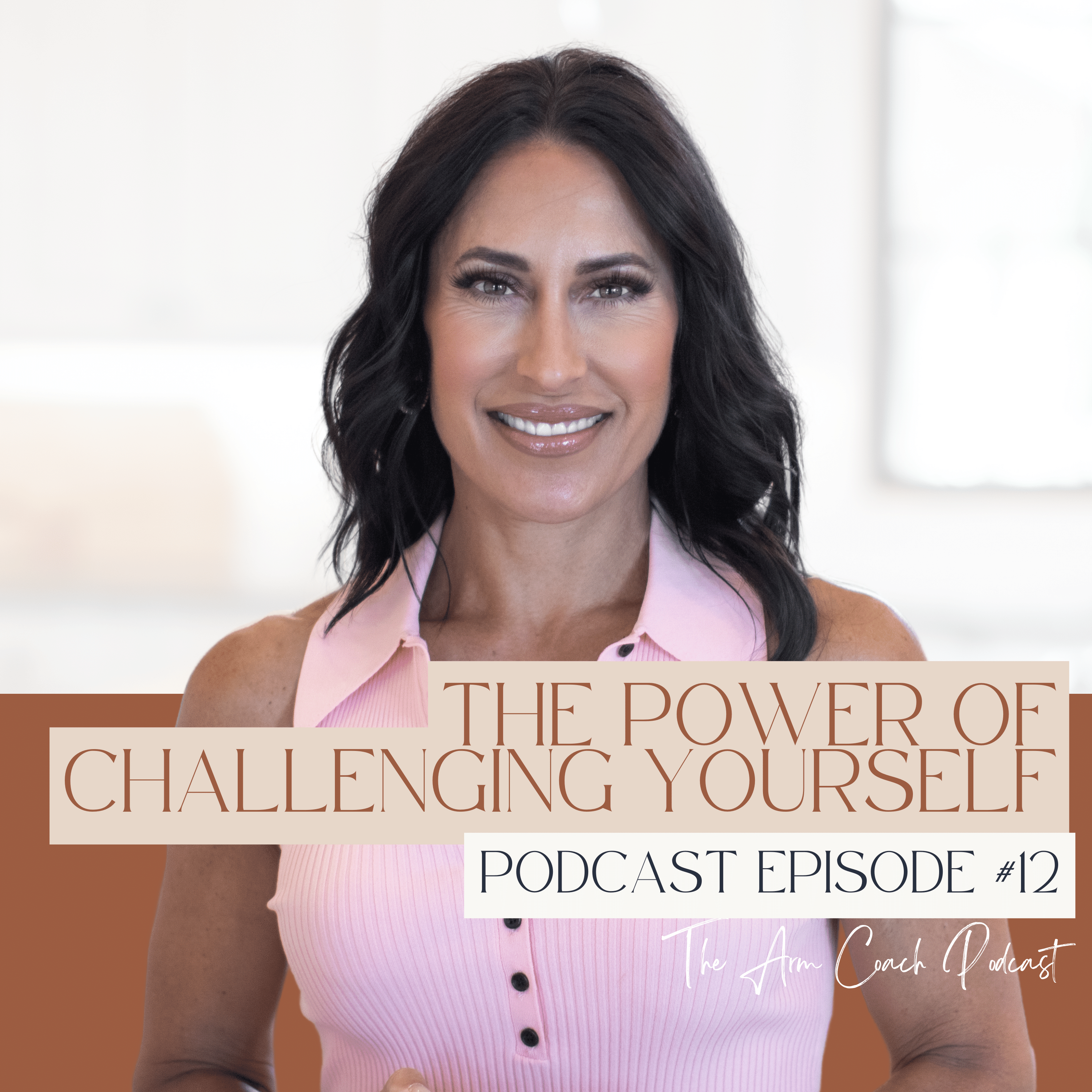Episode Transcript
You have a goal. Check!
You have a great reason for toning your arms. Your big ‘why’.
Check!
And you create a plan. Check!
All systems ready to go.
But wait! As you start your project of working on your mind
and body, certain situations come up. Situations that cause
you to want to change plans and not keep your promises to
yourself.
What do you do? Do you change plans or keep your word, no
matter what?
Let’s look at this common condition:
Hey everyone, welcome
back to The Arm Coach
Podcast, episode 36!
Before we dive in I want to remind you of
something special that will
transform your holidays
into a season of joy,
health, and confidence.
As we all know, the
holiday season can be a
whirlwind of festive treats
and gatherings. But guess
what? You can still enjoy
all the fun without losing
sight of your fitness goals!
That’s why I created my
program, Armed for the
Holidays!
In just three days, I’ll give
you all the tools and
resources you need to
stay on track with your
nutrition and fitness—
even with all the holiday
hustle and bustle.
Whether you're in your
40s, 50s, 60s, or beyond,
this program is designed
just for you, to help you
feel empowered instead
of burnt out and
overwhelmed this holiday
season!
If this sounds like you,
you can grab the program
at a super discounted
price in the podcast
description of this
episode.
Today we're going to talk about this, how do you know when to
absolutely keep your promise to yourself, and when to negotiate
a new one, especially when it comes to exercise and your eating.
So first let's discuss what the true issue is, and how it might
show up in your life. Well, you start off with a promise to yourself.
And that promise, it has to be the most important thing. It needs
to start with a true commitment. That commitment may be to eat
a certain way, to take good care of yourself by lifting weights,
maybe it's to get enough sleep every night. Maybe it's to take a
10 minute walk at lunchtime or in the evening. All things that
sound totally reasonable, right? They're reasonable in the light of
day, when you're not under the gun of making a big decision.
And you probably won't be surprised to learn that the more you
keep your commitments to yourself, the higher your self esteem.
You say you'll do something and when you follow through, you
feel good. You feel proud and you're reinforcing your relationship
with yourself. But things do not always go as planned. You may
not feel like doing what you said you were going to do when you
made that promise to yourself. Life is a series of negotiations. We
negotiate whether to buy something, or whether to save the
money. Whether to spend recklessly or whether to be careful.
Whether to stay or leave a relationship. Whether to keep a job or
walk out and get something different. How to parent a child. How
to handle a few important relationships. These are all
negotiations that we work through all the time.
And also, particularly with yourself, there are also lots of things
that we constantly decide and negotiate. How you eat, how you
exercise, how you live, and even how you think and feel.
So when you make a promise, you're paving the way that you
want to behave, what you want to do, what you want to
accomplish. So this promise that you're making is pretty
important. You might say that if this happens, then I will do that. If
This,Then That. Often, you may make promises to yourself, but
don't always keep them. You may try to say to yourself ‘I'm
going to eat this, and not that.’ You're going to eat when you're
hungry, but you're not going to eat when you're not hungry. You
may aim for this internal balance between what you want and
what you promised yourself you'll do, between what
opportunities present themselves to you. So you're faced with a
constant series of choices, and when you make those choices,
you want to keep in mind what you promised yourself you would
do. It may be something you're trying to change, like make
healthier choices in what you eat. Or it may be something that
you're trying to not do, like not continue eating when you're no
longer physically hungry. All these choices feel like, this kind of,
inner tug of war, and you may constantly feel torn in several
directions. This is common. And so the question comes up, Do
you negotiate? Well sometimes you do. You don't want to
operate from a place that is etched in stone. You do want to live
your life with some flexibility. And sometimes the best choice to
make is just not the most obvious choice. It always helps to look
at the big picture, and the big picture includes things like, what
do you really want. And why do you really want it. Knowing these
things will help you decide whether to stick to your plan, or jump
into that negotiation room with yourself. So it helps to think about
what to consider when these situations come up, and you need
to decide, do I stick to my plan, or do I start bending my own
rules. I mean, let's say you're going to a party. You've been
sticking to your eating plan. Do you continue to stick to it, or do
you ditch it and say, ‘What the heck’. I'm sure you can build a
case for both sides. But you might ask yourself, will being flexible
in this case, help you to not fail. If you eat what you want, but
you control the amount, will that prevent you from just diving in
and eating until you're uncomfortable? Maybe. Will being flexible
still keep you on the road toward what you want? And even if this
is true, just how flexible can you be? How much can you bend
your plan? Linda Spangle wrote a good book called Life is Hard,
Food is Easy. And she created a great way of explaining how to
look at your weight loss journey that I use with my clients
frequently. She talks about the road that we're on, and that when
we want to eat differently and bend our promise, bend our rules,
and treat ourselves differently, that we’re still on the road, but
sometimes we make the road wider, and sometimes when we're
really following all of our rules, we make that road more on the
narrow side. But the important thing to visualize about this road
is, whether it's wider or narrower, we are always on it. We are
never off it. Sometimes we do change our mind, and we do
adapt our promise to ourselves, but we're always on that road.
You never truly get off. So you have a plan, you have like a soft
structure around the plan, and then an opportunity comes up to
deviate, to make that road wider. Do you go for it? Or do you
push yourself to stick to the narrower road? Here's what you
need to know to decide. Should you ditch your plan and do
whatever you want in the moment, you need to think about how
much you want what you really want. This is where you need to
focus. In the moment, the pull of the food is going to temporarily
seem more important. If you say to yourself, ‘Do I really want this
piece of pie, or do I really want to be in control of my eating and
feel great? In the moment, the answer might be no, you really
want the pie. But that's not the truth. If you want to lose extra
weight on your ams and stop overeating on a regular basis, then
you need to keep that image of what you want in the front of your
mind. You need to keep that end game, the vision of how you
want to be and how you want your life to be, in the front so that
it's always in your awareness. Should you bend your own rules
because you won't ever get this opportunity to eat this food
again? Well, I would ask myself, ‘Is that really true’, because the
answer is probably not. Is it really true that you will never get
cake this good again? Or is it really true that you deserve a break
from your eating plan because you've been so good? These two
examples may be kind of easy to see through. Will you never get
cake this good again? It's doubtful that that's true, right? And do
you deserve a break from being good? Is, quote, “being good” or
sticking to your plan, taking you exactly where you want to go, to
get what you really want? Then no. You should stick to your plan
and get over the hump.
It's only uncomfortable because it's new and it's not a habit yet.
When you try to change behaviors, there's this natural hump to
get over. And this hump is uncomfortable. So many situations
may come up where the discomfort is staring you in the face,
and, you know that's when your excuses start coming. The urges
will ask you, ‘Won’t to negotiate with us. We are your urges to
ditch everything and eat whatever you want in the moment’.
Here's when having a strong Why is critical. That strong Why will
help you know what your answer should be.
So, back to the question again. When do you hold firm, and
when do you change your plans? If you are not being honest with
yourself, if you're saying something like, ‘oh, but this is the last
time I will ever get a chance to eat this’, then I want you to hold
to the promise. Do not give in to the moment. Stick to your plan.
If you know that you're physically satisfied, I want you to hold
firm. Because the most delicious food won't be delicious if you're
not hungry. If you are uncomfortable emotionally, then food is not
the answer. Hold firm. Do not give in and do the work to figure
out what's going on for you, and deal with it. Eating or scrolling
to dull an emotion will give you the briefest relief, and then it will
still be there waiting for another vulnerable moment that comes
up again. Hold firm. If you're saying anything like ‘I'll start again
Monday’. Hold firm. Also notice, if this is what you tend to say, I
hope a little alarm goes off in your head, because this is one of
your favorite stories. There's no truth to it, it has no merit, so the
answer in this case is no. Do not negotiate. If you say ‘this isn't
happening fast enough. What's the point?’ Hold firm again. You
need to get over this rough spot. If you keep going, things will get
much easier. But if you give in, you’ll have to get to the same
point over and over again. And it will never get easier. You'll
always run into this wall. We say in one of my groups, when you
get a desire to do something that isn't in your favor, like overeat
or give in to the urge to skip an arm workout, we say, just like it's
our country's policy in foreign affairs that we do not negotiate
with terrorists, and that's what we say. This is how we treat urges
that goes against everything you need, everything you want, and
everything you believe, then no. We do not even talk about it. It is
not an option.
So we just talked about when you will not negotiate. Now let's
talk about when you might negotiate with yourself. When you are
totally honest, and you can say to yourself, ‘Okay, I'm full. I'm in a
good peaceful place. And I want to keep enjoying this taste’, then
you can negotiate a few more bites and move on. Because
you're honest, and you're connected about what you're doing. If
you really are having a big birthday or an anniversary and you
truly are in a unique place that you're unlikely to return to, be
honest, negotiate a bit more, and then move on. Now, you know,
if you work in a typical office, it's somebody's birthday every day,
and there may be cake literally daily. I'm not talking about those
special occasions that are not truly special. I'm talking about your
birthday or an immediate family member's birthday. And if you do
negotiate a bit more and move on, don't keep going. Don't slide
all the way down that slippery slope. No pulling out the old ‘well
I've already slipped I may as well keep going’. When you
consciously choose to negotiate, acknowledge the
consequences and say to yourself, ‘I'm physically not hungry, I
want to keep eating. If I do, I know I will slow my arm
transformation, and I'll delay getting over the hump of this getting
easier, but I'm willing to do that’. If you do decide, clearly,
honestly and consciously, that you will bend your rules for
yourself, this is your choice. But then own it. And own the results
you're creating. I'm not saying that you will never, never bend
your rules. But I am saying that if and when you do, let it be a
choice. Not a slip. Not an unconscious event or default event. Be
awake and aware, and then do it and move on. No judging. No
more overeating or binging on episodes because you've blown it.
Just acknowledge what you did and move on.
Now there are a few parts of you that come into play when you're
doing this negotiation. It's kind of like a committee meeting in
your brain. So there's the visionary part of your brain, that's the
part that can look into the present and look into the future. It can
see the path you're on, and the path you'll go on, if you negotiate
your original promise. The visionary is going to help you make a
clear choice in your favor or not. You want to remember why you
made your promise in the first place, and why you're at this
junction right now. Then there's the rational, adult part of your
brain that helps you analyze the situation and it promotes good
judgment, and it leads you toward what's in your best interest. It
reminds you of what you want, and why. It has no judgment.
Then there's the connector. This is the emotional and relational
part of you. It helps you communicate with yourself in the world.
This part of you helps you get really specific and concrete in your
desires. And then there's the inner fighter. This is where you
control your willpower and your actions. This is where you get the
strength to do hard things. Your job is to, usually in a really short
amount of time, to analyze the situation, calling upon all these
different parts of you, and making a decision. Yes or no. Should
you or Shouldn't you. Have some or pass it up. And then you do
it. You decide. Now whatever you did, is just an incident. But you
need to look at the big picture of how all these little decisions
affect the whole story of your life. Clean up your thoughts, and
move on. You will continue to get more and more experience in
making promises to yourself, and keeping them. And sometimes
you will negotiate, and sometimes you will hold firm. And every
time, you will learn something about you. About your dream. So
remember in a previous episode, you were going to aim for better
not perfect? Every decision made consciously, is better than
those old ones where you just slipped into it with no thought.
Make your plans, make your promise, and if you're tempted to
cave, just check whether it's smart or not. And make sure the
visionary, the rational part of you, the connector and the fighter,
are all consulted. That way you'll be sure to make the best
decision possible. It would be nice if there were an absolute
answer to this question right? Should you ever negotiate. No,
never. It's tempting to be that definite and in the beginning of a
weight loss program, you may believe that you can be that black
and white. But it's not realistic. You know this will come up and
you're going to be able to make the case for both sides. But do it
smartly and then get right back on plan, with no beatings, no
recriminations. When things quiet down, then, take an analytical
look at what happened, and learn and move on.
Now that's it for this coaching session on this subject today. Stay
focused on making your decisions from a smart place, and
deciding when to hold firm, and when to negotiate with yourself.


